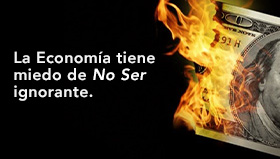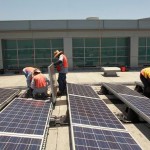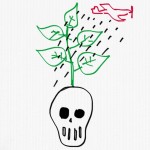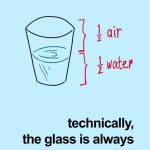Dear all,
I would like to briefly inform you about an important cultural issue we shouldn’t ignore.
While preparing an essay on aquatic ecosystem’s oil spills for La Pampa National University, we focused the subject towards the usual, the oil spills at open sea (here you can check the 3 worst oil spills ever in history) – thinking of these as the prime spillers -, these include the accidents among oil cargo ships, and the sea leaks (oil that escapes because of high pressures coming from the drilled hole at the sea bottom) coming from the offshore oil extraction platforms.
But the truth is that these types of spills only represent the 10% of all oil spills (Ecología y Medio Ambiente. G. Tyller Miller, Jr. Séptima Edición. Grupo Editorial Iberoamericana. 1994. Pages. 679 y 680). The reason for this is that these spills receive all the attention from the media as they are perceived as catastrophic events by society. In other words, these disasters occur in brief periods of time and have a “Wooow!” factor that gains the attention from the media.
We then realized that, in truth, the spills are divided into covered by media (10%) and not covered by media (90%), being these last ones the real problem. The spills not covered by media come from the land, when the oil spilled as a waste by people, cities or industries ends up in water streams which end at the open sea. This is around us in a daily basis though we do not seem to realize it, as it includes simple actions we make in an automatic manner, like throwing a pen to the trash can, or every time you unwrap your cigarettes, or by simply having a computer, driving a car, etc. These actions are linked to our lifestyles and consumption habits as human beings, and are usually not cover by media, as they imply the necessity of making a shift in our human lifestyle. (Making a serious disadvantage in the cash inflow of the mayor industries that dominate the economy, and in certain way, the ones that dominate – until now – the system, by having a greater monetary influence over the governments, even more over underdeveloped countries)
“Without a complete eco-reformulation of our daily lives, as a frame (or habitat) for the human being to exercise who he truly is and needs, we will be doomed to an inflexible decay and animalized degradation.”– Somos La Gente Que Estábamos Esperando, Miguel Grinberg. Kier, Buenos Aires, 2006.
It is important for us to put our thought on this, to understand the role culture plays in all of this. In a society addicted to soccer, talk shows and America’s got talent, the truth is easily eclipsed. But culture – us and our actions, our creative power – should be more intelligent, and direct society towards a more holistic and sustainable view.
For example, we are impressed when 160 people die – instantly – in an airplane crash… and it appears in the media… and the old ladies say “Oh my gosh!!”. But the slow, painful deaths ignored by the mediatic/governmental/businessman Big Brother produced by the lack of supply on the basic needs given by the access to WATER (sanitary services and drinking water) do not impress us.
The inertial, numbed societies are not altered by the death of 3 million people per year – mainly 5 year old kids – due to diarrhea (2 million) and malaria (1 million), by deficiencies in the access to WATER (data taken from the UNESCO’s World Water Assessment Programme). Bluntly said, we don’t care the death of the passangers of 50 daily airplane crashes who, instead of dying in a spectacular hollywood kind of explosion, die very slowly due to the lack of access to water. I do not pretend to offend those deseased in airplane crashes, but I want to highlight this social view issue, and this is what really makes me sad.
The reason society does not speak about these things is because, once again, they do not appear in the media, politicians don’t speak about it, and the products we buy at the supermarket do not tell us the amount of water used in the production processes involved in what we are consuming (like for example the water drunk during so many years by the cow of next Sunday’s barbecue), water that is being taken away from the most vulnerable social sectors.
And the solution NEVER comes from above. Culture is the only driver of social change. Only through a shift in culture we can make it! But somehow, people are still infatuated with the mundane, and governments continue to give shoes and football, instead of imparting knowledge and awareness.
“The fact that no amount of “bread and circus” can compensate for the harm caused are things no one denies nor recognizes, but are supported with an unbreakable silence conspiracy, because it would be too absurd to deny it and reconizing them would condemn the central concern of modern society as a crime against humanity” – Lo pequeño es hermoso, E. F. Schumacher. Blume Ediciones, Barcelona, 1978.
But the Earth is crying out for us to help her, for us to be courageous and unleash our potential as proactive human beings, acting as cooperators with nature, not competitors. We must not be afraid to the tough job that awaits us as a self-aware species if we want to regain our bond with the Earth. Each and one of us must contribute with his grain of sand anyway he can, knowing that that contribution DOES matter.
“In many cases, however, the social innovations and policies are not the result of one superpowerfull person’s influence, but from changes in limited groups of people that start a new way and thus prepare the ground for mass action” – Celebraciones de la Vida, René Dubos. FCE, México, 1985.
I hope all this sounds to you as logic as it did to me these days.
A sincere hug,
Brian Longstaff

















Boletín Consciente N°17 | Ploff.net Sep 09 , 2011 at 05:18 PM /
[…] mi amigo Agustín Darío Estala, Lic. en Relaciones Internacionales, leyó el artículo sobre derrames de petróleo y cultura hace 2 semanas atrás, me escribió una excelente respuesta que quise compartir con ustedes acá. […]
Boletín Consciente N°17 | Ploff.net Sep 09 , 2011 at 05:18 PM /
[…] mi amigo Agustín Darío Estala, Lic. en Relaciones Internacionales, leyó el artículo sobre derrames de petróleo y cultura hace 2 semanas atrás, me escribió una excelente respuesta que quise compartir con ustedes acá. […]